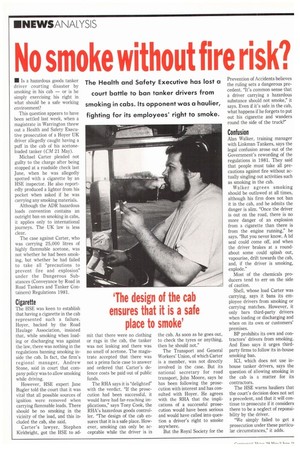No smoke without fire risk?
Page 18

If you've noticed an error in this article please click here to report it so we can fix it.
The Health and Safety Executive has lost a court battle to ban tanker drivers from smoking in cabs. Its opponent was a haulier, fighting for its employees' right to smoke.
11 Is a hazardous goods tanker driver courting disaster by smoking in his cab — or is he simply exercising his right in what should be a safe working environment?
This question appears to have been settled last week, when a magistrate in Warrington threw out a Health and Safety Executive prosecution of a Hoyer UK driver allegedly caught having a puff in the cab of his acetoneloaded tanker (CM 21 May).
Michael Carter pleaded not guilty to the charge after being stopped at a roadside check last June, when he was allegedly spotted with a cigarette by an HSE inspector. He also reportedly produced a lighter from his pocket when asked if he was carrying any smoking materials.
Although the ADR hazardous loads convention contains an outright ban on smoking in cabs, it applies only to international journeys. The UK law is less clear.
The case against Carter, who was carrying 25,000 litres of highly flammable acetone, was not whether he had been smoking, but whether he had failed to take all "precautions to prevent fire and explosion" under the Dangerous Substances (Conveyance by Road in Road Tankers and Tanker Containers) Regulations 1981.
Cigarette
The HSE was keen to establish that having a cigarette in the cab represented such a failure. Hoyer, backed by the Road Haulage Association, insisted that, while smoking when loading or discharging was against the law, there was nothing in the regulations banning smoking inside the cab. In fact, the firm's regional manager, Andrew Stone, said in court that company policy was to allow smoking while driving.
However, HSE expert Jane Bugler told the court that it was vital that all possible sources of ignition were removed when carrying flammable loads. There should be no smoking in the vicinity of the load, and this included the cab, she said.
Carter's lawyer, Stephen Kirkbright, got the HSE to ad mit that there were no clothing or rags in the cab, the tanker was not leaking and there was no smell of acetone. The magistrate accepted that there was not a prima facie case to answer and ordered that Carter's defence costs be paid out of public funds.
The RHA says it is "delighted" with the verdict. "If the prosecution had been successful, it would have had far-reaching implications," says Tony Cook, the RHA's hazardous goods controller. "The design of the cab ensures that it is a safe place. However, smoking can only be acceptable while the driver is in the cab. As soon as he goes out, to check the tyres or anything, then he should not."
The Transport and General Workers' Union, of which Carter is a member, was not directly involved in the case. But its national secretary for road transport, John Moore, says he has been following the prosecution with interest and has consulted with Hoyer. He agrees with the RHA that the implications of a successful prosecution would have been serious and would have called into question a driver's right to smoke anywhere.
But the Royal Society for the Prevention of Accidents believes the ruling sets a dangerous precedent. "It's common sense that a driver carrying a hazardous substance should not smoke," it says. Even if it's safe in the cab, what happens if he forgets to put out his cigarette and wanders round the side of the truck?"
Confusion
Alan Walker, training manager with Linkman Tankers, says the legal confusion arose out of the Government's rewording of the regulations in 1981. They said that people must take all precautions against fire without actually singling out activities such as smoking in the cab.
Walker agrees smoking should be outlawed at all times, although his firm does not ban it in the cab, and he admits the danger is slim. "Once the driver is out on the road, there is no more danger of an explosion from a cigarette than there is from the engine running," he says. "But you never know. A lid seal could come off, and when the driver brakes at a roundabout some could splash out, vapourise, drift towards the cab, and, if the driver is smoking, explode."
Most of the chemicals producers tend to err on the side of caution.
Shell, whose load Carter was carrying, says it bans its employee drivers from smoking or carrying matches. However, it only bars third-party drivers when loading or discharging and when on its own or customers' premises.
BP prohibits its own and contractors' drivers from smoking. And Esso says it urges thirdparty firms to follow its in-house smoking ban.
ICI, which does not use inhouse tanker drivers, says the question of allowing smoking in the cab is a matter for its contractors.
The HSE warns hauliers that the court's decision does not set a precedent, and that it will continue to prosecute if it considers there to be a neglect of reponsibility by the driver.
"We simply failed to get a prosecution under these particular circumstances," it adds.




















































































